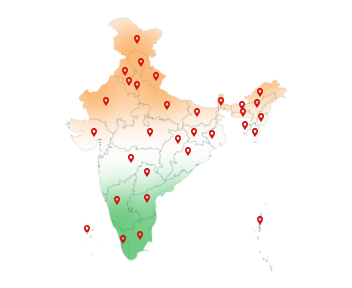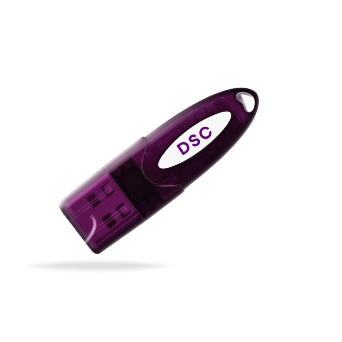22-Aug-2025
Digital Signature - Goods and Services Tax - GST Portal
Filing GST returns has become something that none of us can avoid. In fact, the number of GST filers in India has grown by nearly 65% over the past five years. So, whether you run a small business, manage a startup, or handle finances for a large company. Clearly, it's mandatory! However, with deadlines, forms, and approvals, the process can feel overwhelming. Luckily, the GST Portal has brought most of this online.
But here is a catch! Online convenience comes with responsibility. Every return, registration, or refund claim submitted digitally needs to be secure and authentic. Enter the Digital Signature Certificate (DSC) — the invisible seal that guarantees your filings are legitimate, tamper-proof, and legally recognized.
Want to buy Digital Signature for GST portal? Get Capricorn DSC today!
What is GST?
The Goods and Services Tax (GST) is a comprehensive, indirect tax applied to almost all goods and services in India. It was introduced to replace many different taxes that were previously charged by the central and state governments. In other words, to create a single, unified taxation system.
Types of GST:
CGST (Central GST): Collected by the Central Government on intra-state sales
SGST (State GST): Collected by the State Government on intra-state sales
IGST (Integrated GST): Collected by the Central Government on inter-state sales
With over 12 million taxpayers filing returns on the GST Portal, the system relies on secure authentication mechanisms, which is where the Digital Signature Certificate (DSC) comes into play.
Beginning of Secure GST Filings with DSC
When GST was launched on 1st July 2017, the government made it clear that digital compliance would be the future. Filing returns, registering businesses, and submitting applications would mostly happen online through the GST Portal.
Therefore, DSC was introduced to ensure that digital filings carried the same legal authenticity as physical documents.
Types of DSC Accepted on GST Portal
When it comes to GST filings , not all digital signatures are the same. Here's what you need to know:
Class 3 DSC: It's the most secure type. Class 3 DSC for GST is mandatory for digital filing on GST portal.
USB Token DSC: This stores your certificate on a small USB device, making it portable and safe to use whenever you log in.
Validity: Usually lasts 1–3 years. Don't worry — you can easily renew DSC for GST before it expires, allowing you to continue filing GST without interruption.
Where is DSC Needed in GST?
Here's where you'll need a DSC on the GST Portal:
Filing Returns by Certain Taxpayers
- Companies and LLPs are required to use DSC when filing their GST returns.
- Proprietorships and partnerships can use Electronic Verification Code (EVC) instead, but DSC adds an extra layer of security.
Registration of Businesses on GST Portal
- When applying for GST registration, authorized signatories must authenticate their application with a DSC.
- This ensures the registration request is genuine and legally valid.
Amendments to GST Registration
- Any changes in business details, like name, address, or authorized signatory, require DSC authentication for companies and LLPs.
Filing Refund Claims
- Businesses submitting GST refund claims need to sign the application digitally with a DSC to ensure authenticity.
Other Applications on GST Portal
- Requests like cancellation or transfer of GST registration also require a DSC for secure submission.
- Any application on the GST Portal that has legal implications for the business will likely need a DSC.
Who Needs a DSC for GST Portal?
Confused about who really needs a Digital Signature Certificate for GST portal?
Not every taxpayer is required to use a Digital Signature Certificate (DSC) for GST filings. Here's a simple breakdown:
Mandatory DSC Users:
1. Companies (Private Limited, Public Limited)
2. Limited Liability Partnerships (LLPs)
For these entities, DSC is required for registration, filing returns, and other applications on the GST Portal.
Optional DSC Users:
1. Proprietorships
2. Partnership Firms
These taxpayers can file GST returns using Electronic Verification Code (EVC), though using a GST DSC is recommended for added security and authenticity.
Now you don't need to wonder ”is dsc required for GST registration in company or an individual?” Why? Because you clearly know who really needs it!
How to Register DSC in GST Portal?
Follow these steps to ensure your DSC registration on GST portal is done smoothly:
Steps to register DSC on GST portal for New Users:
1. Open the GST Portal
- Visit the official GST website and click on “REGISTER NOW.”
2. Select TRN Option
- Choose the Temporary Reference Number (TRN) option to proceed.
3. Enter Your TRN
- Type the TRN you received in the designated field.
4. Proceed to OTP Verification
- Click “PROCEED.”
- Enter the OTP sent to your registered mobile number and email. (Note: OTP is valid for 10 minutes only.)
- Click “PROCEED” again after entering the OTP.
5. Register Your DSC
- Navigate to Services and go to the “User Services” section. Under that, you will find “Register / Update DSC”.
Steps to register DSC on GST portal for already registered users:
1. GST Login
- Use your valid credentials to access your account and do GST login smoothly.
2. Access DSC Registration
- Go to My Profile → Register/Update DSC.
3. Select Authorized Signatory
- On the Register Digital Signature Certificate page, choose the PAN of the authorized signatory you want to register from the drop-down list.
Note: Only PANs already mentioned in your GST registration form can be used.
4. Prepare the Signer Utility
- Tick the checkbox that says that the signer is downloaded and installed.
5. Proceed to Sign
- Click Proceed, select your certificate, and then click Sign.
6. Confirmation
- Once the process is complete, a message of successful DSC registration will appear.
Now you know how to register DSC in GST portal. After this step, you can easily do your GST certificate download, GST status check, GST verification, GST registration, etc.
Facing GST errors? Know how to fix them in one go! CLICK HERE!
Buy GST DSC – Capricorn CA
Follow these steps to buy Digital Signature GST from Capricorn CA for all your filings:
1. Select the Type of DSC
- Decide if you need a Signing DSC or a Signing + Encryption DSC.
- Choose the validity period: 1, 2, or 3 years.
2. Verify Your Mobile Number
- Enter your phone number and confirm it using the OTP sent to you.
3. Enter Personal & Business Details
- Provide your name, address, contact information, and company details if applicable.
4. Verify Your Email
- Add your email address and confirm it via OTP or verification link.
5. Upload Required Documents
- Submit scanned copies of Aadhaar, PAN, and address proof.
- For organizations, include company registration documents as needed.
6. Complete Video Verification
- Record a short video for identity verification following the instructions provided.
7. Review Your Application
- Carefully check all the information and documents before submission.
8. Make Online Payment
- Pay securely online for your DSC.
9. Digitally Sign the Application
- Use eSign to complete and submit your application electronically.
10. Download Your DSC
- Once approved, download your DSC onto a secure USB token.
- Your DSC is now ready to use for all GST Portal filings, ensuring secure, legally valid submissions.
Latest GST Updates from April 2025
1. GST Rate Changes
12% and 28% Slabs Removed: The 12% and 28% GST slabs have been eliminated. Goods and services previously taxed at these rates are now taxed at either 5% or 18%, depending on their category. This streamlining aims to simplify the tax structure and reduce compliance complexity.
Introduction of 40% Tax Slab: A new 40% GST rate has been introduced for "sin goods" such as tobacco and luxury items. This move is intended to discourage consumption of harmful products and increase revenue from these sectors.
It's important to know these latest GST slab changes before going ahead to file GST.
2. E-Way Bill Login Enhancements
Mandatory Multi-Factor Authentication (MFA): Starting from April 1, 2025, logging into the e-way bill portal requires multi-factor authentication. This added security measure ensures that only authorized users can access and generate e-way bills, enhancing the integrity of the transportation process.
3. Input Service Distributor (ISD) Registration
Compulsory ISD Registration: Businesses that distribute input tax credit (ITC) on services to their branches or units are now required to obtain ISD registration. This change aims to streamline credit distribution and ensure proper tax credit allocation across the organization.
4. E-Invoicing for Large Businesses
Threshold for E-Invoicing Reduced: The requirement for e-invoicing has been extended to businesses with an annual aggregate turnover (AATO) of ₹10 crore or more. These businesses must generate e-invoices for B2B transactions, facilitating real-time reporting and reducing tax evasion.
5. GST Registration Threshold Limits Increased
Higher Threshold for Registration: The GST Council has increased the threshold limits for mandatory GST registration, making it easier for small businesses to operate without the burden of GST compliance. This change aims to promote ease of doing business and encourage the formalization of the economy.
Need a DSC for GST? Buy Digital Signature Certificate from Capricorn CA now!
Conclusion
With the GST system continuing to evolve in 2025, including new GST rates, e-Way Bill rules, and compliance standards, having a DSC is more important than ever. It not only safeguards your business but also simplifies your interactions with the GST Portal, making online compliance smoother and more reliable.
From registering your business to filing returns, submitting refunds, and other applications, DSC ensures that your digital filings are authenticated, tamper-proof, and recognized by law.


